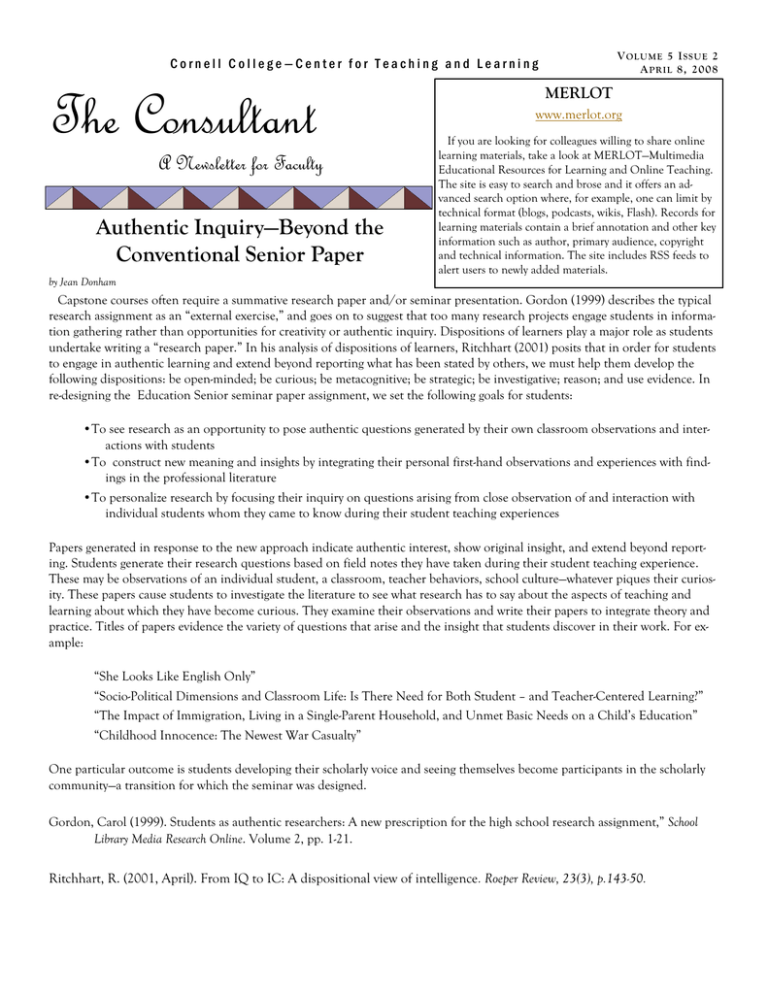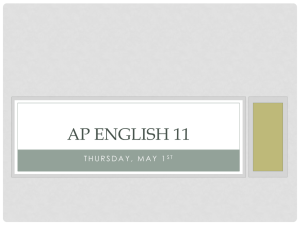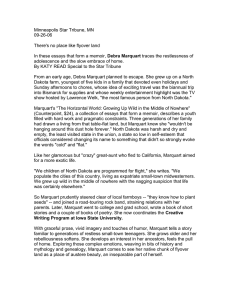The Consultant MERLOT
advertisement

V O L U ME 5 I S S U E 2 A P R IL 8, 200 8 Cornell College—Center for Teaching and Learning The Consultant A Newsletter for Faculty Authentic Inquiry—Beyond the Conventional Senior Paper by Jean Donham MERLOT www.merlot.org If you are looking for colleagues willing to share online learning materials, take a look at MERLOT—Multimedia Educational Resources for Learning and Online Teaching. The site is easy to search and brose and it offers an advanced search option where, for example, one can limit by technical format (blogs, podcasts, wikis, Flash). Records for learning materials contain a brief annotation and other key information such as author, primary audience, copyright and technical information. The site includes RSS feeds to alert users to newly added materials. Capstone courses often require a summative research paper and/or seminar presentation. Gordon (1999) describes the typical research assignment as an ―external exercise,‖ and goes on to suggest that too many research projects engage students in information gathering rather than opportunities for creativity or authentic inquiry. Dispositions of learners play a major role as students undertake writing a ―research paper.‖ In his analysis of dispositions of learners, Ritchhart (2001) posits that in order for students to engage in authentic learning and extend beyond reporting what has been stated by others, we must help them develop the following dispositions: be open-minded; be curious; be metacognitive; be strategic; be investigative; reason; and use evidence. In re-designing the Education Senior seminar paper assignment, we set the following goals for students: •To see research as an opportunity to pose authentic questions generated by their own classroom observations and interactions with students •To construct new meaning and insights by integrating their personal first-hand observations and experiences with findings in the professional literature •To personalize research by focusing their inquiry on questions arising from close observation of and interaction with individual students whom they came to know during their student teaching experiences Papers generated in response to the new approach indicate authentic interest, show original insight, and extend beyond reporting. Students generate their research questions based on field notes they have taken during their student teaching experience. These may be observations of an individual student, a classroom, teacher behaviors, school culture—whatever piques their curiosity. These papers cause students to investigate the literature to see what research has to say about the aspects of teaching and learning about which they have become curious. They examine their observations and write their papers to integrate theory and practice. Titles of papers evidence the variety of questions that arise and the insight that students discover in their work. For example: ―She Looks Like English Only‖ ―Socio-Political Dimensions and Classroom Life: Is There Need for Both Student – and Teacher-Centered Learning?‖ ―The Impact of Immigration, Living in a Single-Parent Household, and Unmet Basic Needs on a Child’s Education‖ ―Childhood Innocence: The Newest War Casualty‖ One particular outcome is students developing their scholarly voice and seeing themselves become participants in the scholarly community—a transition for which the seminar was designed. Gordon, Carol (1999). Students as authentic researchers: A new prescription for the high school research assignment,‖ School Library Media Research Online. Volume 2, pp. 1-21. Ritchhart, R. (2001, April). From IQ to IC: A dispositional view of intelligence. Roeper Review, 23(3), p.143-50. C o r n e l l C o l l e g e — C e n t e r f o r Te a c h i n g a n d L e a r n i n g The Consultant A Newsletter for Faculty One Book, One Campus, One Community by Jennifer Rouse Instilling in our students a love of reading and a love of learning are, of course, the ultimate goals of a liberal arts education. This fall Cole Library will sponsor a One Book, One Campus, One Community project focusing on these goals and creating opportunities for life-long learners to come together to talk about a fantastic book. This year our book selection is The Horizontal World: Growing Up Wild in the Middle of Nowhere by Debra Marquart. Debra Marquart is a professor of English at Iowa State University. She teaches in the MFA Program in Creative Writing & Environment at Iowa State University and the Stonecoast Low-Residency MFA program at the University of Southern Maine. A performance poet, Marquart is the author of two poetry collections: Everything's a Verb and From Sweetness. Her memoir, The Horizontal World: Growing Up Wild in the Middle of Nowhere, was published by Counterpoint Books in 2006. It received the "Elle Lettres" award from Elle Magazine and the 2007 PEN USA Creative Nonfiction Award.* The Horizontal World is what Marquart calls "a biomythography about an agricultural childhood in the rural Midwest." We chose this book as our inaugural read because of its potential to appeal to students and its potential for campus and community connection. Marquart’s story focuses on ―the impulse toward rebellion and flight that comes with being born to a harsh, beautiful, and isolated place." As students are often grappling with issues surrounding home, identity, and sense of place, we feel this book will offer opportunity for all of us to enter into conversation about what it means to come to terms with our personal and political choices. With material drawing from mythology, botany, geology, history, and literary criticsm, this poetic narrative also offers the perfect framework for discussions across disciplines about complex and nuanced ideas as well. The library will host a wide variety of events for campus and community, including book discussions, lectures, and a film festival. We are excited to have Marquart scheduled to come to campus for a lecture and reading on September 18th. She will also be visiting with students and performing with her jazz and blues band during her time here. Stay tuned for announcements of further events! *www.debramarquart.com V O L U ME 5 I S S U E 2 A P R IL 8, 200 8 Consulting with Students in Upper-level Courses People may think of the Quantitative Reasoning Studio as the place for students who are struggling with math to get help. In addition to that, however, many students come here for help on more advanced projects. For example, I often assist students in upperlevel courses, such as methods and seminar courses, with understanding the results section of journal articles and analyzing data from a class research project. Also, I get to work with students doing independent research or working on symposium projects. Together with the supervising professor, we think about the research question, analyze the data, and interpret the results. Like the other Studios in the Center for Teaching and Learning, we at the QRS strive to maintain a consulting relationship with students throughout their time at Cornell, from their first introductory course to senior seminar. by Jessica Johanningmeier Traditionally, writing centers and studios have been seen primarily as places where students get help in responding to academic writing assignments. Although this is certainly a primary focus in Cornell College’s Writing Studio, we want to emphasize that our mission is to help students become better writers. To that end, we have a wide scope in the types of writing we are willing to discuss with students. For example, this year, we have worked with students writing personal statements, filling out graduate school applications, and preparing materials for submission to internship programs. Our aim is to help these students in all aspects of writing, from organizing ideas intentionally to evaluating clarity of expression. In many cases, students working on such materials set up multiple appointments as they move through the writing process. If you have a student or advisee who is applying for an internship or other type of program, please consider suggesting that he/ she stop by the Writing Studio, as we’d be happy to help that student articulate ideas and work toward preparing a polished submission. by Nicole Jackson

